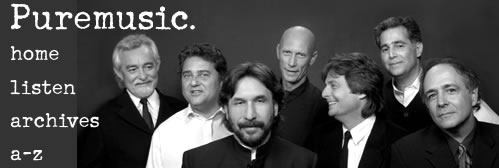 |
|||
A Conversation with Jim Photoglo (continued)
PM: The amazing thing about the Vinyl Kings is the actual personnel, where they all came from. If you wouldn't mind, we should really run through the characters. Tell us a little bit about the depth of their background, some of their credits, history, you know, that kind of stuff.
JP: I'll start in alphabetical order, if I can keep that straight.
PM: How PC.
JP: [laughs] Larry Byrom is, in our band, a guitar player and singer. When I met him, he was predominantly a session guitar player. When we got on stage for the first time, minds were blown, because the guy sings like--
PM: He sings great.
JP: Yeah. I mean, he's the McCartney voice. And he's just a bad boy when he sings. He's got great pipes, but the true history of the man comes out. He was in Steppenwolf, you know. This guy rocked hard in the 60s. But he also is a consummate musician. He's a schooled musician. He plays the piano, he plays the trumpet. He has a very broad musical scope, and he's an accomplished songwriter. He wrote songs when he was with Steppenwolf, and Alison Krauss cut one of his songs.
PM: Wow. Alison Krauss. Do we know what tune she cut?
JP: It's called "Stay." Again, in his session accomplishments, he's one of the guys: he was a first call session player, acoustic and electric guitar. He's just a very instinctual talent. Great instincts and great ears. He's one of those guys who, without changing anything, can make his guitar sound different just by the way he plays it. When he's playing the solo on "You Really Got Me," he hasn't changed anything, he just knows how to lean into it to make it sound like Ray Davies, you know? When a second before that, he was George Harrison, and nothing has changed in his settings. He's just a great musician.
PM: Yeah, just in his hands, and how close he is to the bridge, and all those kinds of things, right.
JP: It doesn't matter what guitar you put in his hands, he's going to make it sound the same.
PM: Who's next, alphabetically?
JP: Larry Lee. Larry Lee, well, his biggest point of notoriety is the fact that he wrote and sang "Jackie Blue," with the Ozark Mountain Daredevils. And so Larry has recorded many albums with the Daredevils, and he had some solo albums out, also, in the late 70s. He has also produced a variety of acts, including Alabama. He co-produced some things with one of the guys in the band, Josh [Leo], produced Alabama and Restless Heart. And I can't remember them all. There are so many of them, I can't remember them all.
He's also a very eclectic cat. In his writing, his sense of tonality, the best way I can describe it is jazz, man. He just hears things in a totally different universe. It's amazing. He's a beautiful guy. He's a very Zen guy. He's our Zen master in the band. He plays percussion and sings the real high stuff in the band, a lot of it.
PM: Is he the high singer?
JP: No. Well, it switches around.
PM: Right. Yeah, there are so many singers that it switches around.
JP: Sometimes during the course of a song, you know, parts switch around. It can get kind of goofy at times.
And then there's Josh Leo. Josh really was the guy who spearheaded this thing. He's also the one who spearheaded the record. Josh is an accomplished producer, an accomplished songwriter, and accomplished session player. Josh is like an architect when he's building a track. When he's creating a track, it's all about the balance and the symmetry, and just the way everything lays. I mean, "architect" is the best way I can describe it. It's most evident if you ever hear the things that he does on his own at his house. It's just laid out so beautifully, it's incredible. And his records always sound really good. They kind of jump out of the radio.
He's had big records as a songwriter, going back to Crystal Gayle in the middle 80s with "Baby, What About Me?" He also produced one of my big songs, "Fishin' in the Dark," by the Nitty Gritty Dirt Band.
PM: Oh, yeah.
JP: He produced Alabama. He's played with Jimmy Buffet, Glen Frey, and Kim Carnes. I mean, all the guys have those kinds of credits, you know. Byrom played with Steve Winwood and Neil Young.
PM: He was even a label exec, was he not?
JP: Oh, that's right. Yeah, he went to work for RCA. He signed Martina McBride. He was a vice president of A&R. continue
print (PDF) listen archives puremusic home